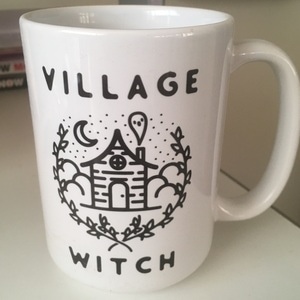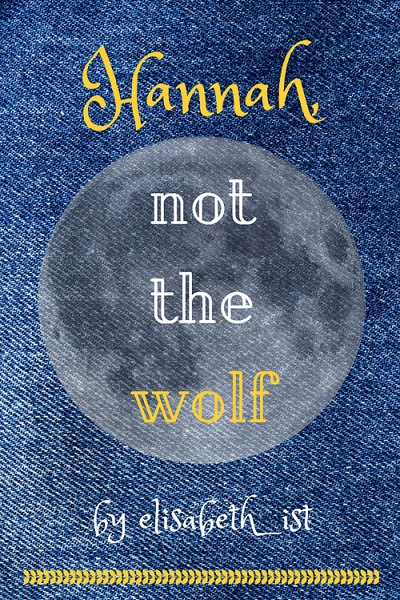A few afternoons later, Hannah and Harry were in her basement, playing a video game they had stolen from Andrew, when Harry asked her something she had never thought much about before.
“Do you ever think about the person who bit you?” he said, navigating his way through an on-screen laboratory. “Where they are now, I mean?”
“Not really,” said Hannah blithely, and avoided an android. “I mean, what’s the point? They’re criminals, aren’t they?”
A scrap of conversation flashed into her mind. Her conversation with Tom and Andrew in the hospital, almost five years before –
…They also talked for a long time about the wolf that bit you and where it is now and stuff. I don’t know why they care, but they definitely do. Mom even cried…
Hannah sat up a little straighter. Her parents had to know what had happened to the wolf – or the person, she supposed – who had bitten her. And yet they had never shared that information. Hannah couldn’t remember a time when the subject had even been discussed. But then again, she had never asked, either. The thought – strange as it seemed, now – had simply never occurred to her.
“You think they’re criminals?” said Harry. “I dunno. The guy who bit me… he was only in Curnow in the first place because of the hospital. He had some other problems, I’m pretty sure. Besides being a werewolf, I mean.”
“So what?” said Hannah. “He still bit you. He’s still a criminal.”
“But he didn’t mean to bite me,” said Harry. Somehow he was still moving expertly through the chamber, dodging even the most determined robots. “He’s a Type Three, you know? And I think he has some trouble with social stuff, and his memory isn’t very good. He wasn’t trying to attack anybody. He was just – I don’t know, Han. None of it’s fair.”
“Not fair to you, you mean,” said Hannah. Being reminded that the wolf who’d bitten Harry was a Type Three hadn’t exactly warmed her to his point of view. “If he couldn’t take care of himself, then shouldn’t somebody else have taken care of him? Watched him, to make sure he didn’t hurt anyone?”
“Maybe he didn’t have any family,” said Harry. “Or maybe they didn’t understand.”
“How could you not understand? What is there to not understand? There’s a guy in your family with problems, and he’s a werewolf, and he could hurt somebody if he forgets about it, which he will, because he has problems. I wouldn’t let him out of my house.”
Harry gave her a funny look. “Hannah…”
“What?”
He sighed. “Nothing. It’s just that you can be a little black-and-white sometimes.”
Hannah threw her controller on the floor and crossed her arms. “That’s better than pretending like anybody can get away with anything as long as they have a reason! If everybody thought like that, then people could just kill each other whenever they wanted, or – or – steal stuff from people’s houses whenever they needed something –”
“Robin Hood was kind of like that,” Harry pointed out. “And I know you like Robin Hood; we watched it together.”
“Robin Hood was different. He was fighting the Sheriff of Nottingham, who was evil, Harry. The guy who bit you wasn’t fighting anyone, was he? He was just being stupid – and his family let him.”
“Maybe I just want to think that he’s a good person,” said Harry quietly. “Maybe I really do think that he is.”
“You’re a good person,” said Hannah. “There’s a difference.”
***
By the time Hannah started eighth grade in September, she had been taking the Moon Pill for almost a year. She grudgingly had to admit that she was grateful for it. Transforming around her parents was no less awkward than it had been the first time – they still insisted on holding family meetings every full moon, and were always twitchy and oversensitive until Hannah had recovered – but having her brothers around made her transformations easier than they had ever been before. After the first few months, none of them even blinked at the wolf version of Hannah. Even Andrew, so ill at ease in the beginning, learned to talk to Hannah as if nothing out of the ordinary was happening. It didn’t matter that she couldn’t answer back.
They even started to have fun with the situation. Hannah knew her parents hated this – her father had gestured, wincing, to the wolf’s teeth one too many times, trying to remind her brothers what they were capable of – but she pretended she hadn’t noticed. One of the few bright sides to being a werewolf was that her parents could only discipline her so much when she was in wolf form.
Moe developed the habit of throwing random items he picked up around the house – a spoon, a shoe, a tube of sunscreen – in Hannah’s general direction. He was still young enough that he was never quite sure whether the wolf was really his sister or a stray, invited indoors one night a month. Andrew tried to explain, but Moe steadfastly ignored him.
“She’ll be back to normal in the morning. She’s not a dog; she’s not going to play fetch with you.”
“I know,” said Moe impatiently. “She’s a wolf. But maybe she still wants to play fetch.”
“Moe, she’s still Hannah. She just looks different.”
“But if she looks like a wolf, why can’t she play fetch with me?”
“For the same reason that you don’t chase after things all the time! She doesn’t want to. And she’s not feeling well, either. It hurts her when she turns into a wolf.”
Hannah knew Andrew meant well, but hearing him talk like this made her stomach roil. Why couldn’t he just shut up and ignore what was happening, like Tom? Was that so hard to do?
So when Moe threw a sneaker at her experimentally, tilting his head to see what would happen, Hannah caught it in one bite and pretended nothing hurt at all.
As the months wore on, Hannah’s parents stopped feeling the need to monitor her whenever she was with the boys, and that meant a new kind of freedom. They played a convoluted version of Telephone in which Hannah attempted to say phrases that were whispered in the wolf’s ear, ending up with a mangled kind of growl. Her brothers raced her up and down the hallway, a competition nobody could win, not even Tom, because the wolf’s legs moved so quickly. Once, when their parents weren’t looking, they put Moe on Hannah’s aching back, laughing together as she carried him around the house like a horse.
Hannah still had to stop at the hospital every now and then to check in with David and Rose, but it wasn’t like before. The cold cells in the hospital basement seemed like a distant memory now. She hadn’t seen James, Tristan, and Nicolas for months. She hoped that she would never see them again.
Eighth grade drew near. At Trevarthen, that meant the addition of twenty new students to Hannah’s class. To her surprise, she discovered that she was now considered one of the more seasoned students, someone who had been there long enough to know the tiniest details about the school. Warren chose her to be a tour guide to a gaggle of anxious-faced sixth graders. Hannah took on the task with undisguised glee.
She also got her period, which was an event that she greeted with considerably less enthusiasm. It was waiting for her when she woke up one Saturday morning, and she dragged herself, red-faced, into her parents’ room, so that she could whisper the news without any of her brothers overhearing. Her mother was much more excited than Hannah had hoped. She launched into a speech – worse and more detailed than anything Hannah had heard in her fifth-grade puberty classes – about what it all meant and how Hannah was physically grown-up now and could have children if she wanted to. Although she definitely shouldn’t, her mother added quickly. Not for years, at least.
“I don’t want to have any kids ever,” said Hannah. “So it’s a waste of time. I wish you could just tell your body to turn it off. Make it stop.”
“You might change your mind someday,” said her mother, smiling.
“No,” said Hannah. “I won’t. Also, how would that even work?”
“What do you mean?”
“How would it work for me?” said Hannah impatiently. “I have stupid lycanthropy, remember? You’re the one who’s always talking about it. I mean, would the baby turn into a wolf on full moons too? Or would it be like a human baby inside of of a wolf? I mean, what if people thought I’d eaten it?”
Her mother looked alarmed, then tired. “Hannah –”
“And would it be a werewolf after it was born? And what if it was a full moon? That would be really awkward for the doctors, wouldn’t it? What would happen then?”
Hannah was promptly evicted from her parents’ room, though not before being given an exasperated hug and a pamphlet. Apparently Rose had given the pamphlet to her mother several months before. Hannah didn’t particularly want to read it, but eventually her curiosity became too strong, and she couldn’t stop herself.
She immediately wished she had just thrown it away. It was written in a condescending, sanctimonious tone, accompanied by some badly illustrated diagrams that made Hannah’s entire body cringe.
It seemed that Hannah’s first guess had been correct, that the fetuses of werewolves also transformed into wolves when the full moon rose. The pamphlet explained that this made transformation even more painful than it already was, but had never been shown to affect the child once it was born. Lycanthropy wasn’t hereditary, so after birth, children of werewolves never transformed. Births on the full moon rarely occurred – apparently werewolves’ bodies regulated these things, to make up for the transformations that they couldn’t control. It was all (according to the pamphlet) a very efficient system.
Hannah balled it up, tossed it to the other side of her room, and cursed Rose for thinking she might find it interesting. Growing up was awful.
Still, Hannah’s eighth grade year went fairly smoothly until a blustery December evening just a few days before Christmas. The full moon hung heavily in the sky, Hannah lay curled on Tom and Andrew’s bunk bed, and everything went wrong.











Comments (7)
See all